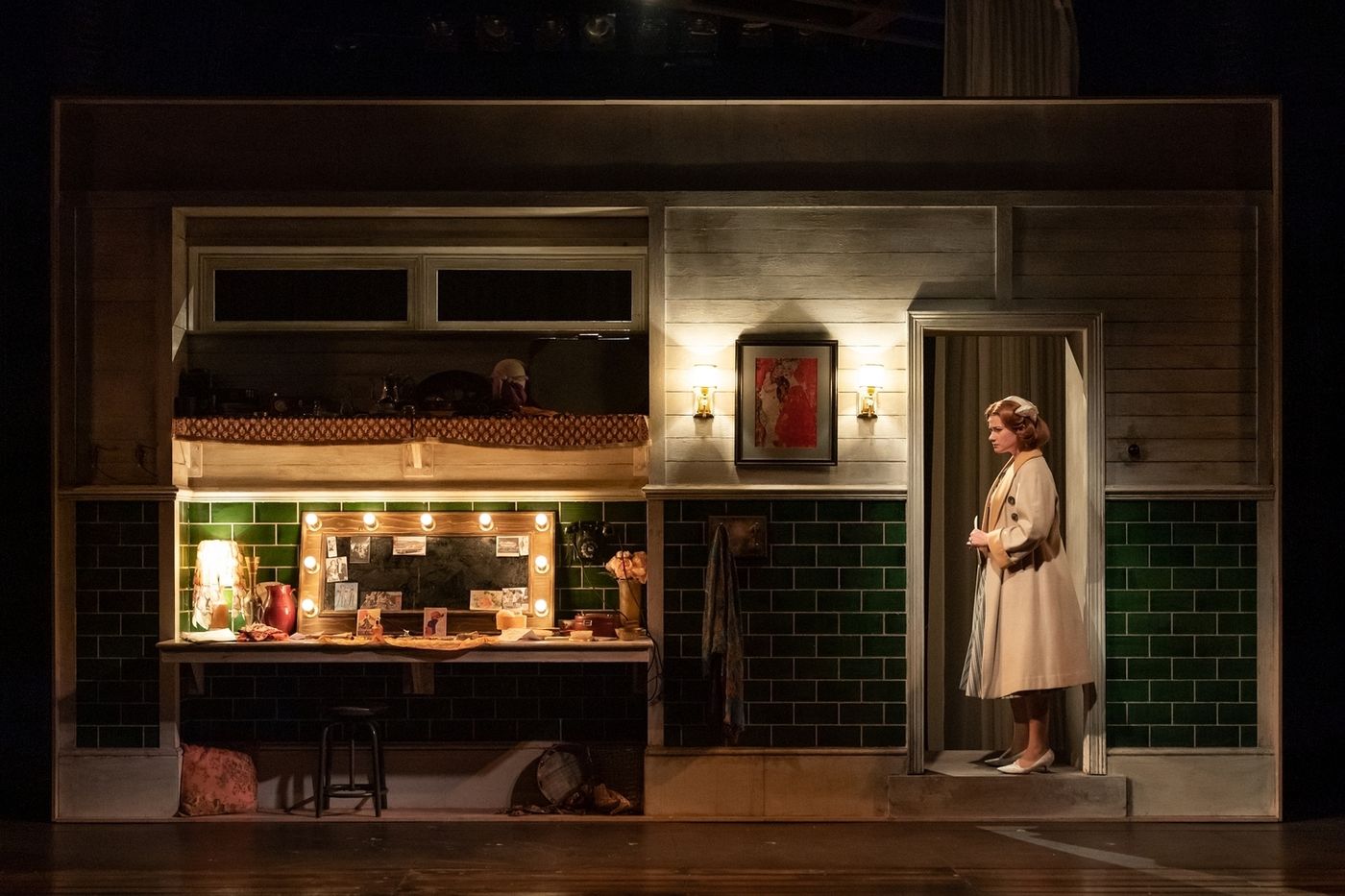Review: WIFE, Kiln Theatre

![]() In some offshoot theatre in Kilburn, a production of A Doll's House (though here called A Doll's Home) is in technical rehearsals. The year is 2019 and the production is gender fluid: Nora is now played by Cas (Calam Lynch) and Torvald by Suzannah (Sirine Saba). A mistake is made, the house lights go up, and Suzannah's frustration is made clear: all her life she has waited for the role she describes as "Hamlet for women".
In some offshoot theatre in Kilburn, a production of A Doll's House (though here called A Doll's Home) is in technical rehearsals. The year is 2019 and the production is gender fluid: Nora is now played by Cas (Calam Lynch) and Torvald by Suzannah (Sirine Saba). A mistake is made, the house lights go up, and Suzannah's frustration is made clear: all her life she has waited for the role she describes as "Hamlet for women".
Situated just before the end of the first half of Samuel Adamson's Wife, this is already the third version of A Doll's House audiences have seen within this show. Spanning a time period of 90 years and four generations of lovers, Adamson uses Ibsen's original play and continues its critique of relationships and marriage by bringing it into our present moment and beyond. For the most part, this is a compelling show with a surprising amount of comedy.
Wife presents four couples: Daisy and Robert, Ivar and Eric, Cas and an older Ivar, and Clare and Finn. Brimming under the surface of the heterosexual relationships are also homosexual desires: in 1959, Daisy is in love with actress Suzannah, who is playing Nora. Each section - set in 1959, 1988, 2019, and 2042 - begins with a scene from Ibsen, mostly the final one where Nora leaves, though a rather modern tarantella also offers an explosive end to the first act.
Structuring Wife around adaptations of Ibsen, Adamson acknowledges the prevalent re-staging of the original play. Characters discuss the work at length, breaking down what the young Ivar (Joshua James) calls "Nora's miracle".
When Nora smuggles a macaroon behind Torvald's back early on in Ibsen's A Doll's House, it begins a drama about lies and the power dynamics of the Victorian household. Yet Wife is deeply concerned with the end of the play, with the impact of the final scene on the characters frequently shown as a call to celebrate free choice. As Wife makes clear, history repeats itself, with the period costumes of the 1959 show returning in 2042, but in between is the more interpretive production of 1988 and 2019's gender-fluid version.
Richard Kent's design keeps each period distinct, though the theatrical framing is never lost due to the pieces of a proscenium arch hanging above the stage. Much like the four snapshots presented, this arch is fractured and disjointed, with the pieces hanging like an incomplete jigsaw.
Yet by the end of Wife, Adamson has revealed his ability to craft an incredibly self-referential story. From gin drinking to violent acts of attempted abortion, visiting the Frog and Trumpet pub to cries of "Dutch courage" before drinking, references, echoes and allusions to earlier scenes permeate the play. Where Suzanne mocks Daisy's husband Robert by crying "Yay, it's alive" when he finally speaks in 1959, Cas likewise uses the same joke against Clare in 2019.
Whilst this self-referentiality is certainly impressive, by the end of Wife these references become rather smug, and one feels that less would have been more to demonstrate the connectedness of the characters and the beliefs of the time periods they represent.
The title of Adamson's play may reveal its focus on relationships both heterosexual and queer, but it is vitally also about children. In Ibsen's play, Nora leaves both her husband and her children. Such was the response at her resolution to do so that in 1880 the ending of the play was rewritten by the dramatist so that Nora declares "It is a sin against myself, but I cannot leave them" before sinking to the floor by the nursery door.
It is at the very least ironic, then, that children form the connective tissue that surrounds the skeleton of lost love and abandoned desires the play presents. Ivar is the son of Daisy, Clare is Eric's daughter, and in 2042 Clare's daughter Daisy visits another Suzannah, also an actress now playing Nora. Given each section begins with Pamela Hardman bringing on Nora and Torvald's child in the re-enactments, Adamson manages to impress the importance of not only the past but also the future onto these characters.
As the hardened actress Suzanne, Sirine Saba constantly communicates the impact of a life dedicated to art. Karen Fishwick commendably presents three women all at different points in their lives - married, engaged and single - with an optimism for a better life alongside the fear of what may not work out.
Richard Cant's calming dignity and maturity as an older Ivar also works as the perfect complement to Calam Lynch's very funny Cas. Director Indhu Rubasingham has clearly allowed each actor (and their multiple characters) the breathing space to become intricately connected to each role, and the way each actor imbues whichever character they are playing with the ghost of the past and future is impressive.
Throughout Wife, characters postulate about what Nora does when she leaves the Helmer residence. This is as much a piece about family, marriage and relationships as it is about the importance of theatre on everyday life. We might not know what Nora does when she slams the door, but with each retelling Adamson stresses the importance of taking that first step and doing what makes you happy. At that point, like Nora during her tarantella, are you "dancing to live".
Wife is at the Kiln Theatre until 6 July
Photo credit: Marc Brenner.
Reader Reviews
Videos

